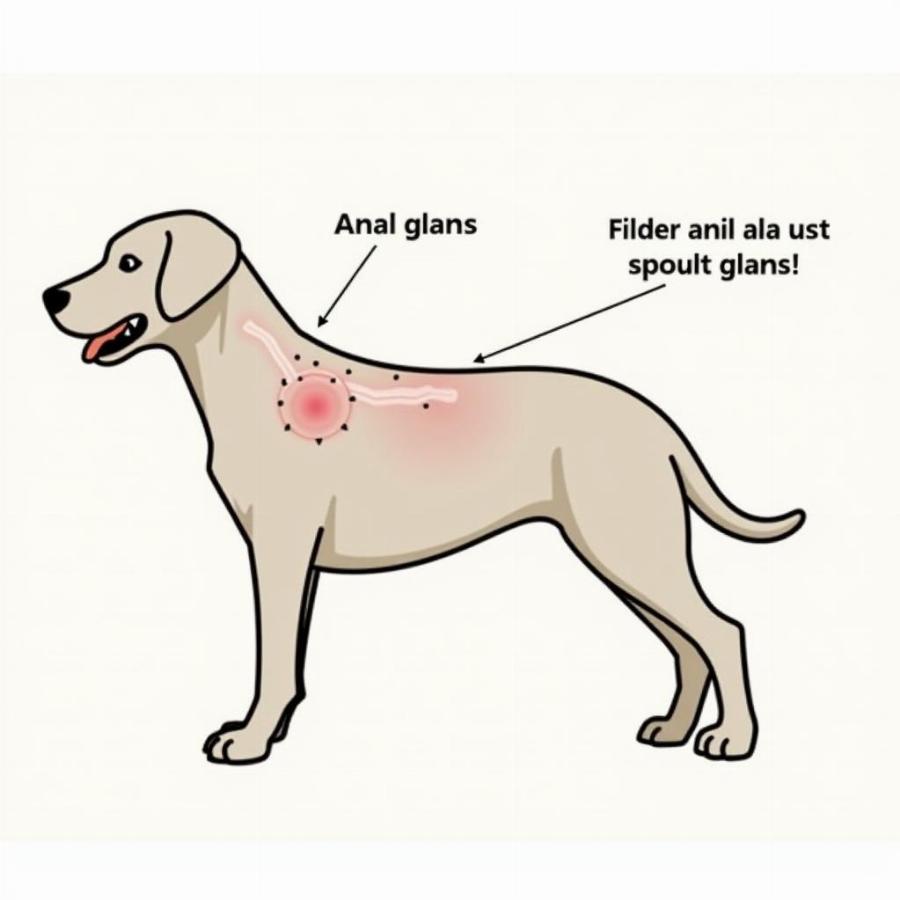As a dog owner, you’ve probably witnessed your furry friend engaging in some, shall we say, interesting behaviors. One of the most common (and puzzling) is the infamous butt-licking routine. But why do dogs lick their butts? Is it normal? Should you be concerned? Let’s delve into the world of canine hygiene and decode this curious habit.
Understanding the Anal Glands
The answer to the butt-licking mystery often lies in two small sacs located near your dog’s anus, aptly named the anal glands. These glands produce a fishy-smelling fluid that serves as a form of identification for dogs. Think of it as their own unique signature scent.
 Dog anal glands anatomy
Dog anal glands anatomy
Typically, these glands express naturally during defecation, adding a pungent aroma to your dog’s “business.” However, sometimes these glands can become impacted or infected, leading to discomfort and an increased urge to lick and scoot.
Reasons for Butt-Licking
While anal gland issues are a common culprit, several other reasons might explain your dog’s affinity for their rear end.
1. Anal Gland Problems
Impacted or infected anal glands are a frequent source of discomfort for dogs. When these glands malfunction, your dog may resort to licking, scooting, or even biting at the area to relieve the pressure and itching.
2. Hygiene
Just like humans, dogs have their own hygiene routines. Sometimes, a little leftover residue after a bathroom break might prompt a quick clean-up lick. It’s their way of staying fresh and tidy.
3. Allergies
Allergies in dogs often manifest as skin irritation. If your dog is allergic to certain foods, environmental factors, or even parasites like fleas, they may lick excessively at their rear end, along with other areas, to soothe the itch.
4. Parasites
Fleas, ticks, and worms can all cause discomfort in dogs, particularly around the tail and rear end. Your dog might resort to licking and biting in an attempt to relieve the itching and irritation caused by these pesky critters.
5. Behavioral Issues
In some cases, excessive licking, particularly when not related to a physical issue, can be a sign of anxiety, boredom, or stress. Just like some people bite their nails, some dogs lick excessively as a coping mechanism.
When to Worry
While occasional butt-licking is generally no cause for alarm, excessive licking or signs of discomfort warrant a trip to the veterinarian.
Look out for these red flags:
- Scooting or dragging their bottom on the ground
- Whining or yelping when touching their rear end
- Redness, swelling, or discharge around the anus
- Excessive licking accompanied by other symptoms like vomiting, diarrhea, or lethargy
How to Help Your Dog
If you notice your dog licking their butt more than usual or exhibiting any warning signs, consult your veterinarian. They can:
- Determine the underlying cause
- Express the anal glands if needed
- Prescribe medication for infections or allergies
- Recommend dietary changes or supplements
- Provide guidance on behavioral modification if stress or anxiety is a factor
Preventing Future Issues
While not all causes of butt-licking are preventable, some proactive measures can minimize the occurrence:
- Regular Vet Checkups: Include anal gland expression during routine vet visits, especially for breeds prone to anal gland issues.
- Balanced Diet: A healthy diet rich in fiber can promote regular bowel movements and help naturally express the anal glands.
- Parasite Prevention: Use flea and tick preventatives year-round and deworm your dog regularly as recommended by your vet.
- Address Allergies: Work with your veterinarian to identify and manage any allergies your dog might have.
- Enrichment and Exercise: Provide ample opportunities for physical activity and mental stimulation to reduce boredom and stress.
Conclusion
Dog licking butt is a common behavior that, while sometimes perplexing, usually has a simple explanation. By understanding the potential causes and recognizing warning signs, you can ensure your furry friend stays happy, healthy, and, well, a little less smelly! If you have any concerns, don’t hesitate to reach out to your veterinarian for expert advice.
FAQs
Q: Is it normal for my dog to lick their butt after pooping?
A: Yes, a quick lick after going to the bathroom can be part of normal hygiene. However, excessive licking or scooting might indicate a problem.
Q: How often should my dog’s anal glands be expressed?
A: It varies depending on the dog. Some dogs never need their glands expressed, while others require it monthly. Your vet can advise on the best schedule for your pup.
Q: Can I express my dog’s anal glands myself?
A: It’s not recommended. Improper technique can cause injury or discomfort to your dog. It’s best left to a professional.
Q: What are some signs of anal gland infection?
A: Look for redness, swelling, discharge, a foul odor, and signs of pain when touching the area.
Q: Can diet affect my dog’s anal glands?
A: Yes, a high-fiber diet can help regulate bowel movements and naturally express the glands.
Need More Help?
For more detailed information and personalized advice on dog licking butt and other canine health topics, visit Beaut Dogs at https://beautdogs.com. When in doubt, always reach out to your veterinarian or contact us at [email protected] for expert guidance. We’re here to help you keep your furry friend healthy and happy.